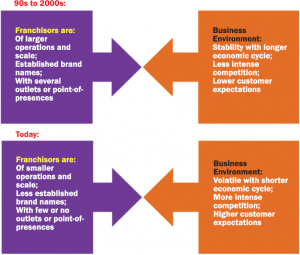Franchisors are changing along with times. Traditional school-of-thought proposes that franchisors should meet certain criteria before considering franchise as a mode of expansion. These include:
- Having several operations-owned outlets;
- Track record in the business
- Having an established brand name/Reputation
- Ability to support the franchisees in the franchisor-franchisee relationship
- Strong financial strength
While these basic criteria remains relevant in today’s world, their expectation has evolved along with the expectations of franchisees and the industry. The increase in competitiveness of the business landscape, shortening of the economic cycle, higher expectations of the end-consumers and demand for innovative concepts have prompted smaller, younger, and less-renowned business concepts to venture into the franchising environment, offering their intellectual property and business expertise to achieve economies of scale, garner brand awareness and in some instances, business survival.
Volatility in the Business Environment
Since 2005, the business landscape in South East Asia had witnessed the financial crisis in 2008-09, followed by a boom in property prices in 2010-2011, and an expected slowdown in the global economy in 2013. The shortening of economic cycles has intensified the need for businesses to explore modes of business survival and reaching their customers in the shortest possible time. Businesses and concepts no longer have the luxury of time to expand at their own pace, sort out their operational issues, and to accumulate brand awareness. Likewise, customers have raised their expectations towards business and concepts, expecting more value-added services, greater convenience, more products and services’ varieties and higher customer service standards.
Uncertainty in economic cycles has also resulted in the loss of jobs, and the creation of new job opportunities. Unfortunately, job scope of the new openings do not always coincide with the skill sets of individuals who has lost their previous positions, resulting in a job gap/void. PMEBs (Professional, Managers, Executive and Businessmen are increasingly being ousted in each round of economic cycle, leading to individuals in their late 30s and early 40s facing the real prospects of being retrenched, unable to find a suitable job as their skills and mindsets have been rendered obsolete with the fast-changing business environment and new job scope expectations.
The aggregation of the business environment, along with the impact on individuals made obsolete by this environment, and the emergence of younger, smaller and less-renowned business concepts, presents a changing face in the landscape of the franchising industry. The diagram below shows the change in the driving forces of the franchising industry in the 90s to 2000s, as compared to recent years.

New Generation of Franchisors
Today’s franchisors have characteristics which are different from the predecessors of the 90s and 2000s. These characteristic make-ups also represent higher risks to franchisees and candidates, alongside increasing competition and customer expectations.
New/first-time franchisors are less stable, smaller in business size and experience, yet need to respond to changing economic and industry pressures, to meet the increasing demands of customers. These factors push them towards either organic expansion or expansion via franchising, often leeraging on less-than-ideal support systems and personnel within the franchisor’s existing organizations.
In recent times, we have witnessed the boom-and-bust of fads(which many has termed as sustainable business during their boom time) of bubble tea in the early 2000s, coffee buns in the mid-2000s, donuts in the late 2000s, just to name a few. These fads rode the euphoria of customers’ demands during their boom time, and came crashing as fast as their rise. Further analysis into some of these concepts which sprouted out during their growth phase, revealed that many of these brands had little or no structures and systems. Their strategy (or tactic) was simply to expand into more locations to ride the demand for their products when they were the “best-seller” of the season. Many franchisees of these concepts burnt their pockets when they invested into these franchises during the peak of the cycle, only to suffer due to its short-lived peak and its subsequent steep decline. Such “black-holes” have eroded the confidence of franchisees and impacted on the franchising industry negatively.
Moving Ahead
At the point of writing, our industry sees many yogurt players(our current count stands as 21 yogurt-based concepts in Singapore), as well as the “re-birth” of many bubble-tea concepts and locations accross the island. Will these concepts stand the test of time, or will it go down in records to be the first fad of the second decade in the 21st century? Time is the best witness to the verdict.
Franchising brings a set of pros and cons to the table, as new franchisors are attracted to many advantages which a successful franchise may bring to their brand and operations. Many franchisors – with unstable or untested business concepts – are exploring franchising as their only alternative to expand their reach and customer base. In land-scarce SIngapore, along with escalating renatl rates and business costs, these franchisors have to embark on the franchising journey much earlier then their initial plans – to achieve economies of scale, higher profit margins, wider business awareness and increase customer database – so as to stay in this competitive game of business and survival.
Franchisees have to stay ahead of the game and be more savvy so as to avoid disappointment and investment loss. While the fundamentals of franchising remain, and potential franchisees are more open to new business concepts and opportunities, they should ask for in-depth questions, request for more information, and analyze their franchisors more carefully. On the other hand, franchisors will do well to establish proper business systems and structures, engagement procedures with the franchisees and stay committed to the franchising journey. It is possible to be young, small and a promising brand, while achieving the same heights as their predecessors who are more established, well-known and with stable operations. The proven brands started young and small too, didn’t they?
 Gary Loh is the Director of Purpleclay Consulting Pte Ltd, which is a franchise consultancy firm and grant application specialist. Purpleclay Consulting has assisted many promising franchise brands for local and overseas expansion, as well as assisting these brands in winning various business accolades and awards.
Gary Loh is the Director of Purpleclay Consulting Pte Ltd, which is a franchise consultancy firm and grant application specialist. Purpleclay Consulting has assisted many promising franchise brands for local and overseas expansion, as well as assisting these brands in winning various business accolades and awards.
This company is an approved SCOPE-IP Business Consultant under the Intellectual Property Office of Singapore (IPOS) and an I-Advisor under International Enterprise Singapore (IE Singapore).
Gary can be reached at +65 6561 3011 or email at contact@purpleclay.com.sg. For more information, visit www.purpleclay.com.sg






